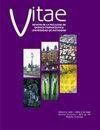EFFECT OF MANGO (Mangifera indica) CV. AZÚCAR JUICE CONSUMPTION ON PLASMA ANTIOXIDANT CAPACITY AND OXIDATIVE STRESS BIOMARKERS
Q3 Pharmacology, Toxicology and Pharmaceutics
引用次数: 1
Abstract
Background: Mango (Mangifera indica L.) is one of the world’s most consumed fruit, and it is also a rich source of antioxidants that may prevent oxidative stress. Objectives: This study aimed to determine if mango (cv. Azúcar) juice can improve the antioxidant status of healthy individuals with low consumption of vegetables and fruit. Methods: This was a cross-over single-blind study carried out with 16 healthy individuals for 73 days. Participants were randomly assigned to either a mango juice period or a placebo period. Total phenolic content, antioxidant capacity, mangiferin, thiobarbituric acid reactive substances (TBARS), total glutathione, and 8-hydroxydeoxyguanosine levels were determined in plasma. Results: Plasma antioxidant activity was significantly higher in the juice consumption period than the placebo consumption period; however, total phenolic content, total glutathione, TBARS, and 8-hydroxydeoxyguanosine levels did not show significant differences between juice period and placebo period. Mangiferin was detected in every participant after juice consumption. Conclusions: Mango (cv. Azúcar) juice daily consumption improves plasma antioxidant capacity.芒果(芒果)的效应。AzÚcar果汁消耗对血浆抗氧化能力和氧化应激生物标志物的影响
背景:芒果(Mangifera indica L.)是世界上消费量最大的水果之一,它也是抗氧化剂的丰富来源,可以防止氧化应激。目的:本研究旨在确定芒果(cv。Azúcar)果汁可以提高低蔬菜和水果摄入量的健康人的抗氧化能力。方法:这是一项交叉单盲研究,对16名健康个体进行了为期73天的研究。参与者被随机分配到芒果汁期或安慰剂期。测定血浆中总酚含量、抗氧化能力、芒果苷、硫代巴比妥酸反应物质(TBARS)、总谷胱甘肽和8-羟基脱氧鸟苷水平。结果:果汁饮用组血浆抗氧化活性显著高于安慰剂饮用组;然而,总酚含量、总谷胱甘肽、TBARS和8-羟基脱氧鸟苷水平在果汁期和安慰剂期之间没有显着差异。果汁饮用后,每个参与者体内都检测到芒果苷。结论:芒果(cv;Azúcar)每天饮用果汁可以提高血浆的抗氧化能力。
本文章由计算机程序翻译,如有差异,请以英文原文为准。
求助全文
约1分钟内获得全文
求助全文
来源期刊

Vitae
PHARMACOLOGY & PHARMACY-
CiteScore
1.20
自引率
0.00%
发文量
0
审稿时长
>12 weeks
期刊介绍:
The journal VITAE is the four-monthly official publication of the School of Pharmaceutical and Food Sciences, and its mission is the diffusion of the scientific and investigative knowledge in the various fields of pharmaceutical and food research, and their related industries. The Journal VITAE is an open-access journal that publishes original and unpublished manuscripts, which are selected by the Editorial Board and then peer-reviewed. The editorial pages express the opinion of the Faculty regarding the various topics of interest. The judgments, opinions, and points of view expressed in the published articles are the responsibility of their authors.
 求助内容:
求助内容: 应助结果提醒方式:
应助结果提醒方式:


